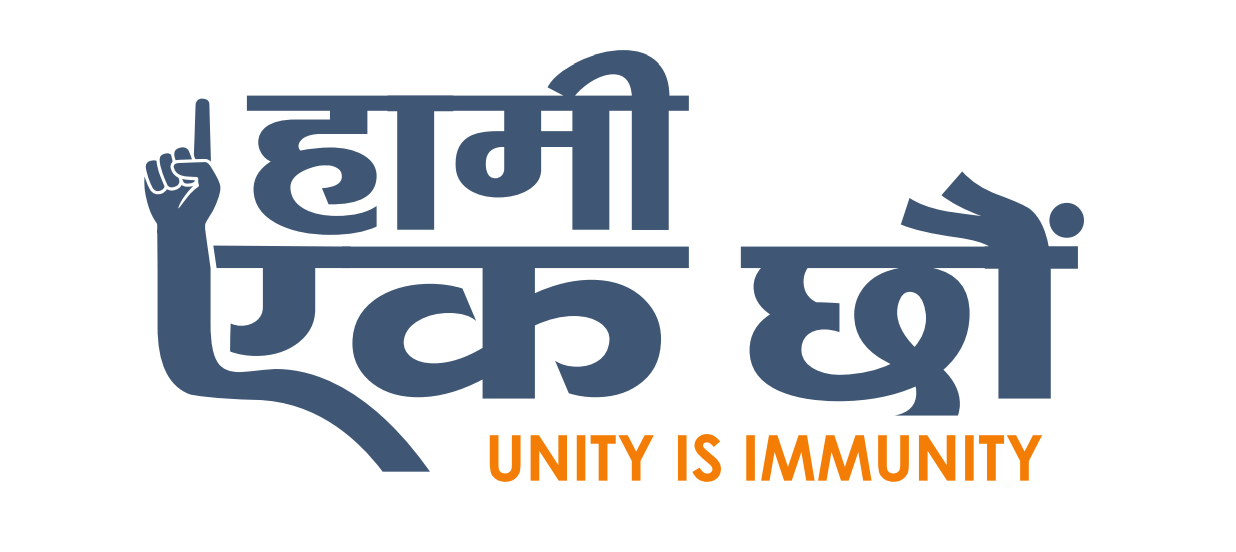Phurba Sherpa sets new record
Singer, director and journalist Phurba Sherpa has managed to set yet another record. Recently, while accepting the certificate for his previous record, Sherpa made another one: accepting the certificate of his record at a world-record height of 5,364 meters from the sea level.
Sherpa had made it to the Guinness Book of World Records in 2004 by singing an entire song with only one letter of the Devanagari script “Ma” on the album “Geet Ek Akshar Ko.” Recently, the UK’s World Book of Records had accepted it as a record as well. Phurba got the official certificate of the World Book of Records at the Everest base camp.
Reading during the pandemic: An act of self-care
I’ve always loved to read. The first book I read by myself was probably the Ding Dang Dong series which was published in 1985. They were short tales of three monkeys who got into hilarious situations but each book also had a moral lesson. This was followed by Aesop’s Fables, a collection of stories by Aesop, a slave and storyteller in ancient Greece.
As a child, my sense of right and wrong mainly came from the stories I was told and read. Stories I heard were from the Panchatantra, Mahabharata, Akbar and Birbal, and Grimms’ Fairy Tales. These stories were, now that I know better, tweaked to fit my parent’s changing ideas on how to raise me right.
The stories I read, on the other hand, weren’t always as black and white or centered on the need to be good. Enid Blyton’s books made me jump from compound walls I was forbidden to climb and fill my pockets with stones before getting on the weighing scale to freak my mother out. Roald Dahl’s books showed me there was fun in being mischievous—that mischief wasn’t as bad as it was made out to be. For the longest time, I believed I could be Matilda, that I could harness my mind’s power to move things like she did in Dahl’s classic by the same name published in 1988.
Books made me climb out of a ditch (that I had gotten into in the first place to prove some boys I could be like them), jump from the rooftop of one truck to another at my grandparent’s home in Hetauda, and venture on mini-excursions of my neighborhood, pretending to be Nancy Drew. In hindsight, books made life exciting by giving wings to my imagination and, in the process, teaching me things I wouldn’t have learnt otherwise.
Now, with the exception of politics, there isn’t anything I don’t read. But fiction is what I turn to when I’m in need of a pick-me-up or am unable to make sense of things. It’s comforting to get lost in another world when you find yourself stuck where you don’t want to be.
Stories are what kept me sane during the 2020 lockdowns, and what is helping me manage stress right now. And, indeed, many of us have turned to books for comfort, distraction and escape in a tremendously upsetting time. Rojita Adhikari, a freelance journalist, says she reads to forget the pain she is going through. Adhikari is recovering from covid and is still weak and a bit scared. Reading, she says, is a great distraction and helps calm her nerves.
Adhikari feels she narrowly escaped death. Her condition deteriorated after a week of being diagnosed, and she considers herself lucky to have pulled through. Though she is much better now, the thought of what could have been haunts her. That is when she turns to books. Even reading for 15-20 minutes is enough to change the course of her thoughts.
Similarly, a school friend, Sanyukta Rajbhadari, says reading is like meditation. Books, she says, transport her to a different time and era and she finds some much-needed solace in these unprecedented times. She is a doctor and work can be a little too demanding, which is why she reads—to shift her focus for all that stresses her out.
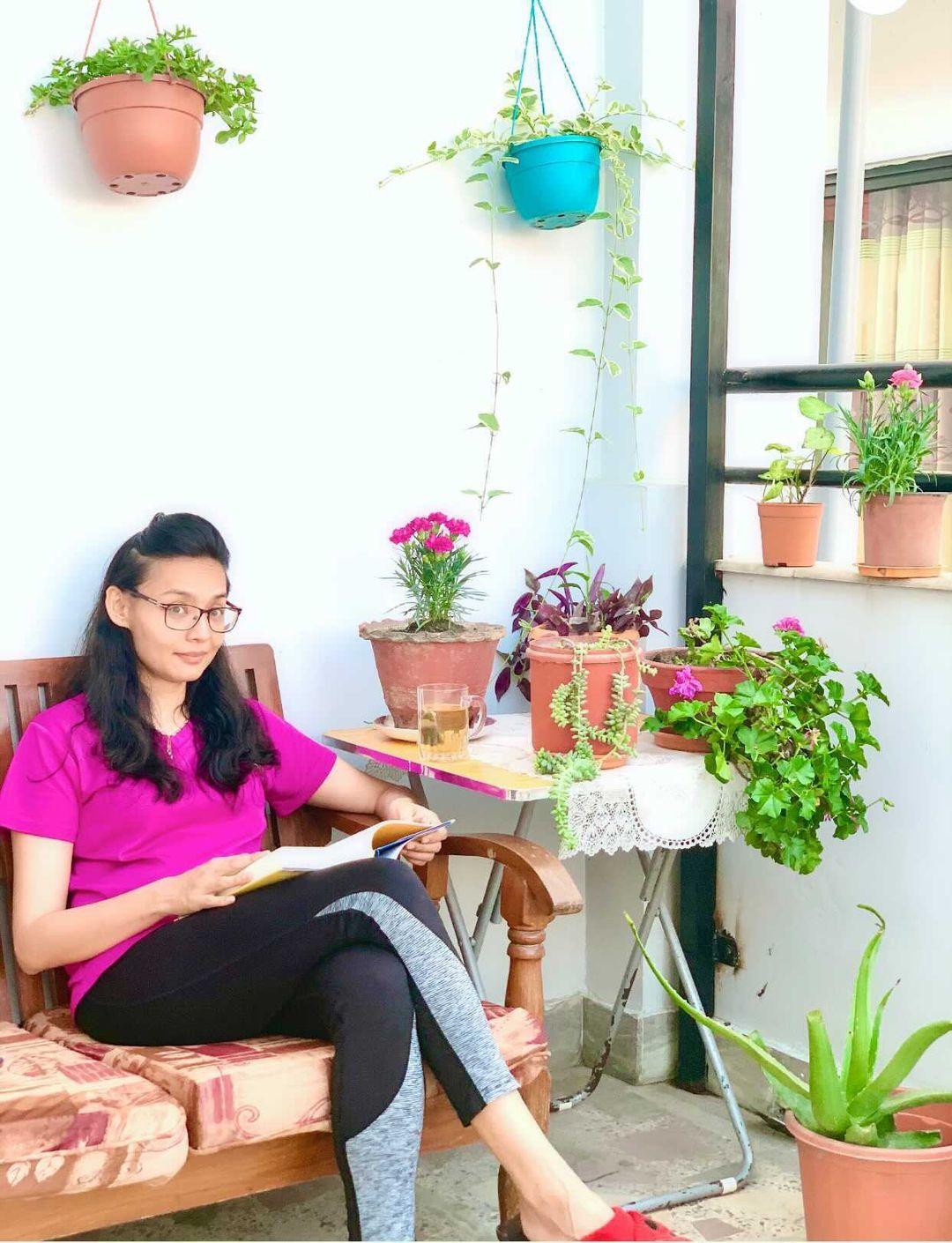 Sanyukta Rajbhandari
Sanyukta Rajbhandari
“I just finished reading The Mermaid and Mrs. Hancock by Imogen Hermes Gowar and it took me to 18th century Gregorian London. It was just what I needed to escape reality and recharge,” says the self-confessed book hoarder. The sight of books, she says, is enough to make her smile.
I could relate to her because when it gets a bit much, as it often does these days, I find a story can take you to a place where your problems don’t exist anymore. It has become so essential to be able to turn off that mental switch and there really is no better way to do it than by reading.
Prajjwol Kunwar, founder of Laibary, an online bookstore, says people are definitely reading more during the pandemic. Orders have increased and though Laibary isn’t currently delivering books, there is a steady stream of enquiries from customers. Pratima Sharma, online sales and marketing officer, Nepal Mandala Book Shop, says they too are getting constant requests from customers to resume delivery, and they are considering it.
 Pratima Sharma
Pratima Sharma
Prajjwol says he is reading more than ever before. He also has the time to be a bit indulgent with his reading habits. Meaning, he lets one book lead to another—choosing to do in-depth research about topics he is interested in which, at the moment, is mythology. Pratima claims her reading habit has been a boon during lockdown. Books help her disconnect and don’t let her mind wander pointlessly.
A 2009 study at the University of Sussex found that reading can reduce stress by up to 68 percent. The study found that individuals who read for as less as six minutes had slower heart rates, less muscle tension, and lower stress levels. The neuroscientist who conducted the study reported that “reading is an active engaging of the imagination that stimulates your creativity and causes you to enter what is essentially an altered state of consciousness.”
Stories that mirror your feelings calm you down because you realize your experiences aren’t unique and that is immensely comforting. It also helps to explore possible fictional scenarios related to your problems by stepping into the character’s shoes. I recently read The Pull of the Stars by Emma Donoghue, a novel based on the 1918 influenza-pandemic. It’s grim and heartbreaking but the story mimics the present-day Covid crisis and makes you feel a little less alone and doomed.
The book also made me a little less angry—at the politics that’s still going on despite the health crisis we are facing. There’s a chapter where a character criticizes the government for Dublin’s poverty and high infant mortality. Another says she doesn’t have time for politics which gets the reply, “Oh, but everything’s politics, don’t you know?” Seeing how some things are a constant no matter where in the world you are lessened my sense of injustice.
What’s more, I find reading can sometimes foster a sense of community with other readers as well as the characters in the book and that is more crucial today than ever before. I might not be able to meet anyone but the conversations I’m having with people, because of our shared interest in books, have helped me connect with them on a deeper level.
Here, I must also confess that sometimes reading feels like a luxury. There’s a sense of guilt about not being prudent with my time by helping those in need. But what the pandemic has also taught us is to take care of our mental health and practice self-care. And reading is the only way I know how to do that.
Society | Tourism entrepreneurs in Gorkha stare at mountains of debt
When tourism-related activities boomed on the Manaslu trekking route, many people living in the area ventured into the hotel business while existing hotels expanded their capacity.
But when the entire tourism sector witnessed an unprecedented slump due to the Covid-19 pandemic, entrepreneurs who invested in hotels by taking loans with interest rates as high as 36 percent per annum are now in distress as the hotels have been shut down for the most part of the year in the region.
Ganesh Karki, a hotelier, complains that he is in a stage where he does not know if he should cry out of despair or laugh out of frustration. “After failing to provide the required services to tourists coming to my place, I decided to take a loan at whatever interest I had to pay to increase the capacity of the hotel,” Karki says. “But last year, there was a fall in tourist numbers due to dengue and this year, Covid has completely ruined business.”
Karki informs that he took a 160,000 rupee loan with a 36 percent interest rate per annum from a local loan shark. “I have paid Rs 240,000 as interest alone and still, the principle has not been reduced by a single rupee,” Karki says, “My creditor does not stop demanding money even when he can see that my business has not been running at all.”
The creditor demands the interest amount every day and when Karki cannot pay on time, he doubles and then triples the interest, adding to the total due amount. Not only Karki, many other hoteliers in the Manaslu area have also fallen into the trap of compounding ‘meter interest.’ Ram Kumar Gurung, ward chairman of Chumanubri Rural Municipality-3, says that there are many complaints about non-payment of loans at 36 percent interest.
“Initially, the tourists started coming here in droves and hoteliers ran out of places to keep them. So they took loans at exorbitant interest rates to increase their capacities,” Gurung explains, “Now that the business has been down for months, they have been unable to pay their dues and the creditors come to us with complaints.” The ward office has been mediating between the creditors and debtors by asking the debtors to pay at least the principle first and the accrued interest at a later date.
Businesses in the area were forced to take personal loans at high-interest rates because the banks refused to invest in the tourism sector, says Karki. “Had the banks invested in our business, as they do in the cities, we would have been in a better situation,” Karki says. Residents complain that the banks do not even operate properly in the area. Consumer committee members are forced to walk for seven days to get to Gorkha Bazaar, the district headquarters, at the end of the fiscal year because the banks in the rural municipality do not offer complete banking services.
Superheroes | Nepali nurses risking it all
Narbada Thapa, nursing supervisor, Tribhuvan University Teaching Hospital (TUTH), was terrified when the World Health Organization declared a pandemic in March 2020. Despite her two-decade-long career, she felt unprepared to deal with what was happening. In the months that followed, Nepal too saw a surge in the number of Covid-19 cases. The condition then, says Thapa, wasn’t as grave as it is now but the sense of unease was more.
Narbada Thapa
“We didn’t know how to deal with highly infectious diseases. We were baffled,” says Thapa. In the past year, she has worked with a lot of covid patients and she is no longer scared of the virus. Nurses, she says, can’t afford to be.
According to Thapa, during the first wave of Covid-19, there were limited PPEs. This required a nurse wearing one to be on duty for 10 to 12 hours without a break. It’s not possible to eat, drink or go to the bathroom while clad in a PPE so many of her colleagues went unimaginably long hours without food or water. Some even wore diapers.
Thankfully that isn’t the case anymore, says Thapa. But that doesn’t mean their work is any less daunting. The second wave of Covid-19 has brought forth a new set of challenges, from shortage of oxygen and ventilators to being unable to provide the one-on-one care that critical patients require. The viral strain is stronger and highly contagious and, compared to earlier, there are more serious cases.
There are also many deaths every day, which is unsettling. Additionally, every day is harrowing and humiliating: Sometimes, frustrated family members get angry and abusive. Mana Kumari Rai, president of Nursing Association of Nepal (NAN), says many times nurses have been physically abused because family members weren’t allowed into the ICU or they felt their patient wasn’t being looked after properly.
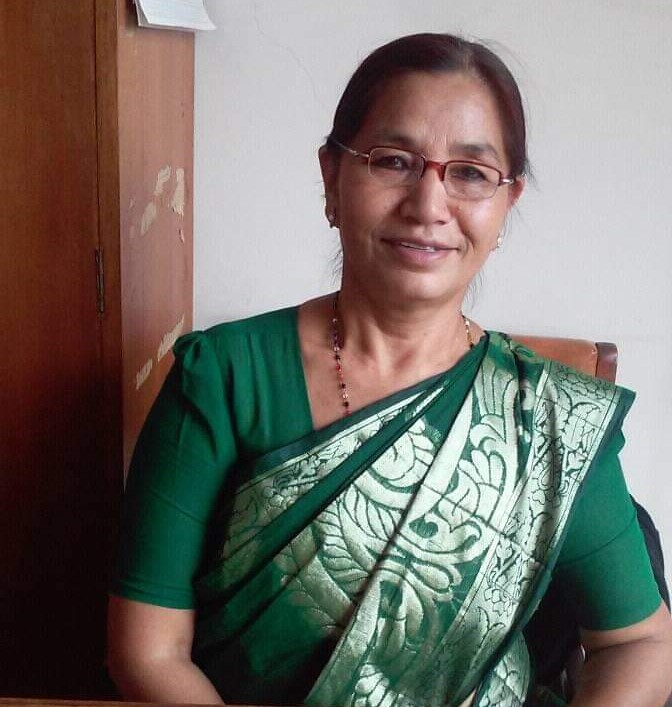 Mana Kumari Rai
Mana Kumari Rai
But valiant nurses on the frontlines don’t let anything dampen their sprits. Given the rate of infection and the rise in the number of people needing medical intervention, hospitals are inundated. Every nurse, who earlier used to work in eight-hour shifts, is on a 12-hour shift, and sometimes without breaks too.
Durga Shrestha, matron, Bheri Hospital in Nepalgunj, says they are so short-staffed that it’s impossible for those on duty to get a moment’s rest. The hospital has 260 general beds and 100 emergency beds and not a single one is empty. On top of that, they get hundreds of calls every day, from friends and friends of friends, seeking help.
“We try to accommodate as many people as possible. But our best isn’t enough anymore,” says Shrestha, adding they had anticipated a second wave and even prepared for it. What they didn’t foresee was how catastrophic it would be.
 Durga Shrestha
Durga Shrestha
Bheri Hospital is the referral site for three provinces and thus they get a lot of patients. Upon arrival at the hospital, the oxygen saturation of some patients has been as low as 40. There’s very little chance of recovery in such cases.
“It hurts knowing we won’t be able to save them. Worse, we are sometimes forced to watch people suffer because of reduced oxygen supply and equipment and medicine shortage,” she says. The hospital needs over 400 cylinders every day. There are times when there’s a demand and supply gap for an hour or two and many people lose their lives.
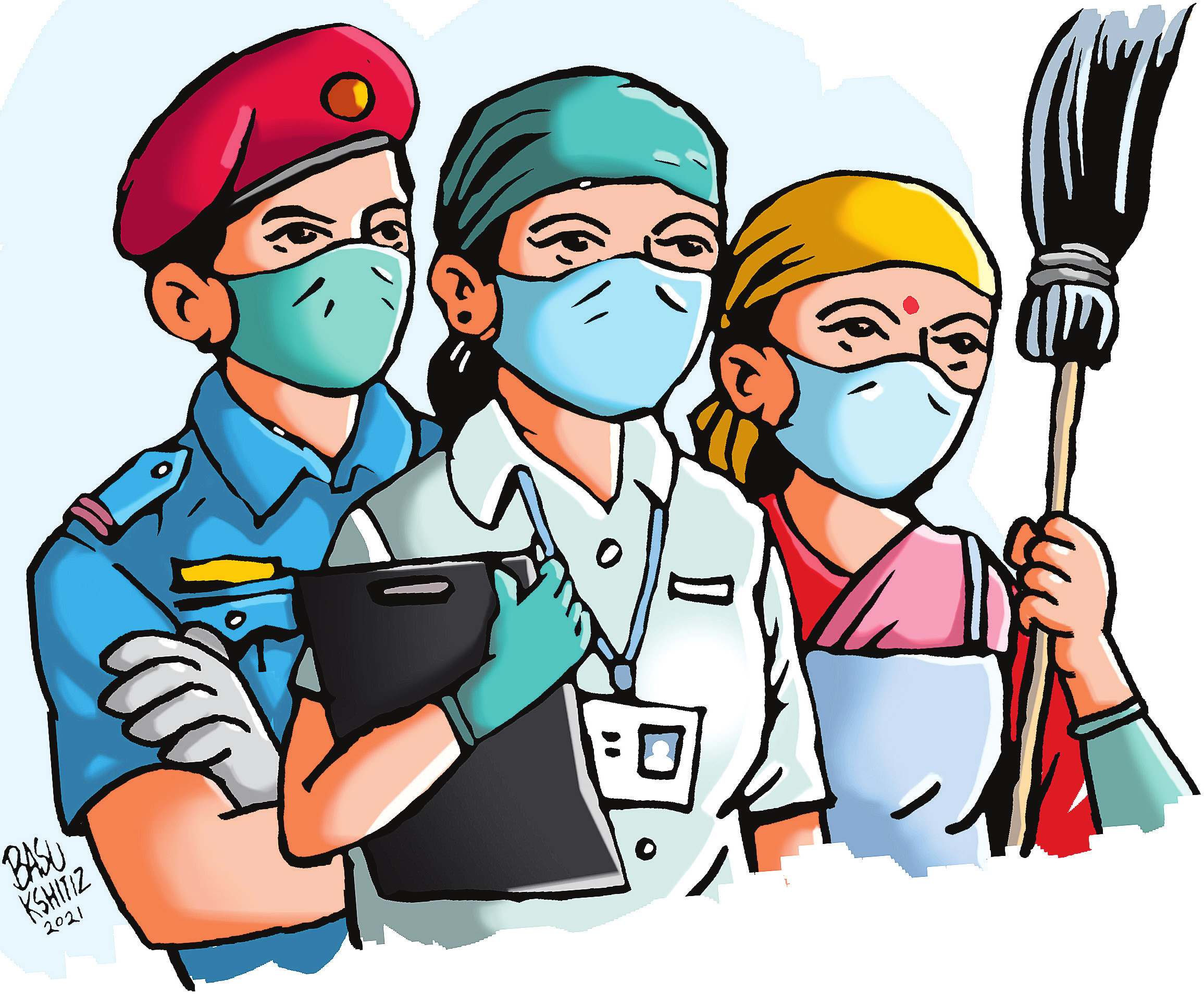
Nursing is basically bedside care and when you work so closely with patients—talking to them, hearing their stories—you are bound to get attached. Not being able to save them, especially when they tell you they want to live but feel like they are slowly suffocating to death, is heartbreaking. Nurses working in covid ICUs and wards say they are filled with guilt. When one death follows another, the effect is numbing.
Prabha Gautam, a critical care nurse, says the workload is immense and exhausting. She has no time for her family and her two-year-old son. Even when she is home, her mind is at work, wondering if some of her patients will survive the night and what reality awaits her the next day.
 Prabha Gautam
Prabha Gautam
“I know there is a need for me to detach and take care of my mental well-being. But there’s no wiping certain painful images from my head. It’s traumatic,” she says.
Sleeplessness, chronic headache, anxiety and stress are some of the many issues these healthcare workers face. They also have sweating-related itchiness due to long hours in gowns and PPEs. Some have wounds on their faces because masks have to be worn tightly. What do they do? Put band-aids on them before strapping their masks back on and resume work.
Most nurses have also been living in isolation in their own homes since the start of the pandemic. Thapa can’t remember the last time she had a meal with her family or met her granddaughter. Abodh Kumar Shah, staff nurse at TUTH, says he hasn’t met his parents. He desperately wants to but their safety is more important.
 Abodh Kumar Shah
Abodh Kumar Shah
Every nurse ApEx spoke to confessed their families were worried about them. Chhetra Rokka, nursing supervisor, Pokhara Academy of Health Sciences, who has been working for 27 years, says her husband wanted her to retire and stay at home. But she would have regretted it if she had quit at a time when her services were required the most.
Her son suggested that the family should focus on keeping their immunity up by having nutritious food and exercise extreme caution to minimize the risk of infection. Rokka’s family have, so far, managed to stay safe.
Not all have been as lucky. Shrestha and her entire family have been infected. Thapa too had covid and it was horrible, she says. Rai, president, NAN, says many nurses across the nation have been infected and some have had to be kept on ventilators.
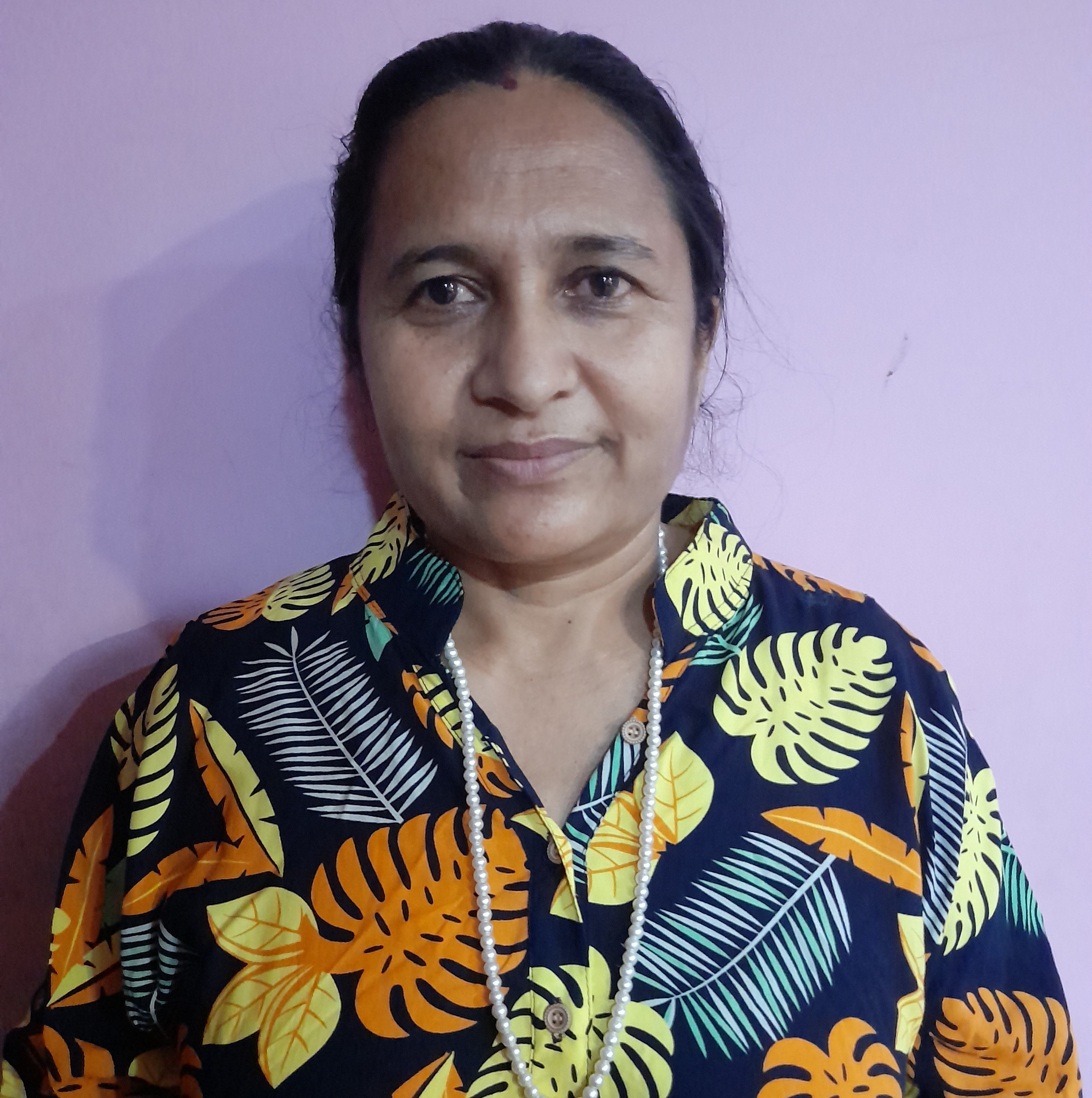 Chhetra Rokka
Chhetra Rokka
“It’s a difficult time but we can’t and won’t give up. I would like to request people not to take the virus lightly. Wear a mask, stay home, practice social distance, and help us stop the spread,” concludes Rai.










